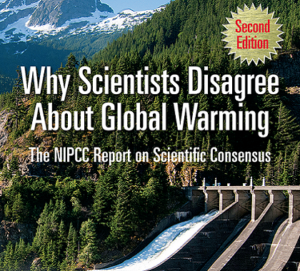
Why Scientists Diagree about Global Warming, 2:a upplagan
Climate Change Reconsidered II
NIPCC Summary for Policymakers, 2013-09-17
NIPCC (Non Governmental Panel on Climate Change) SPM, en från FN fristående rapport, kan laddas ner här.
SPM om effekter av global uppvärmning, oktober 2018
IPCC: http://www.ipcc.ch/report/sr15/
Among the findings reported in the Summary for Policymakers:
- Fossil fuels deliver affordable, plentiful, and reliable energy that is closely associated with key measures of human development and human welfare. There is a strong positive relationship between low energy prices and economic prosperity. Economic prosperity in turn is crucial to human health and welfare. Wind and solar power are incapable of delivering the affordable, plentiful, and reliable energy that is delivered by fossil fuels.
- Fossil fuels require the development of substantially less surface area than renewable energy sources, rescuing precious wildlife habitat from development. The power density of fossil fuels enables humanity to meet its need for energy, food, and natural resources while using less surface space, rescuing precious wildlife habitat from development. In 2010, fossil fuels utilized roughly the same surface area as devoted to renewable energy sources yet delivered 110 times as much power.
- The environmental and human welfare impacts of fossil fuels are overwhelmingly positive. Sixteen of 25 identified impacts of fossil fuels are net positive. Eight are uncertain, only one is net negative. Some of the identified impacts include agriculture, air quality, extreme weather events, human health, and human mortality.
- Reducing fossil fuel use to achieve dramatic reductions in carbon dioxide emissions would inflict tremendous economic hardship. Reducing greenhouse gases to 90 percent below 1990 levels by 2050 would require a 96% reduction in world GDP, reducing per-capita GDP to $1,200 from $30,600 now forecast. Per-capita income would be at about the level it was in the United States and Western Europe in about 1820 or 1830, before the Industrial Revolution.


Senaste kommentarer